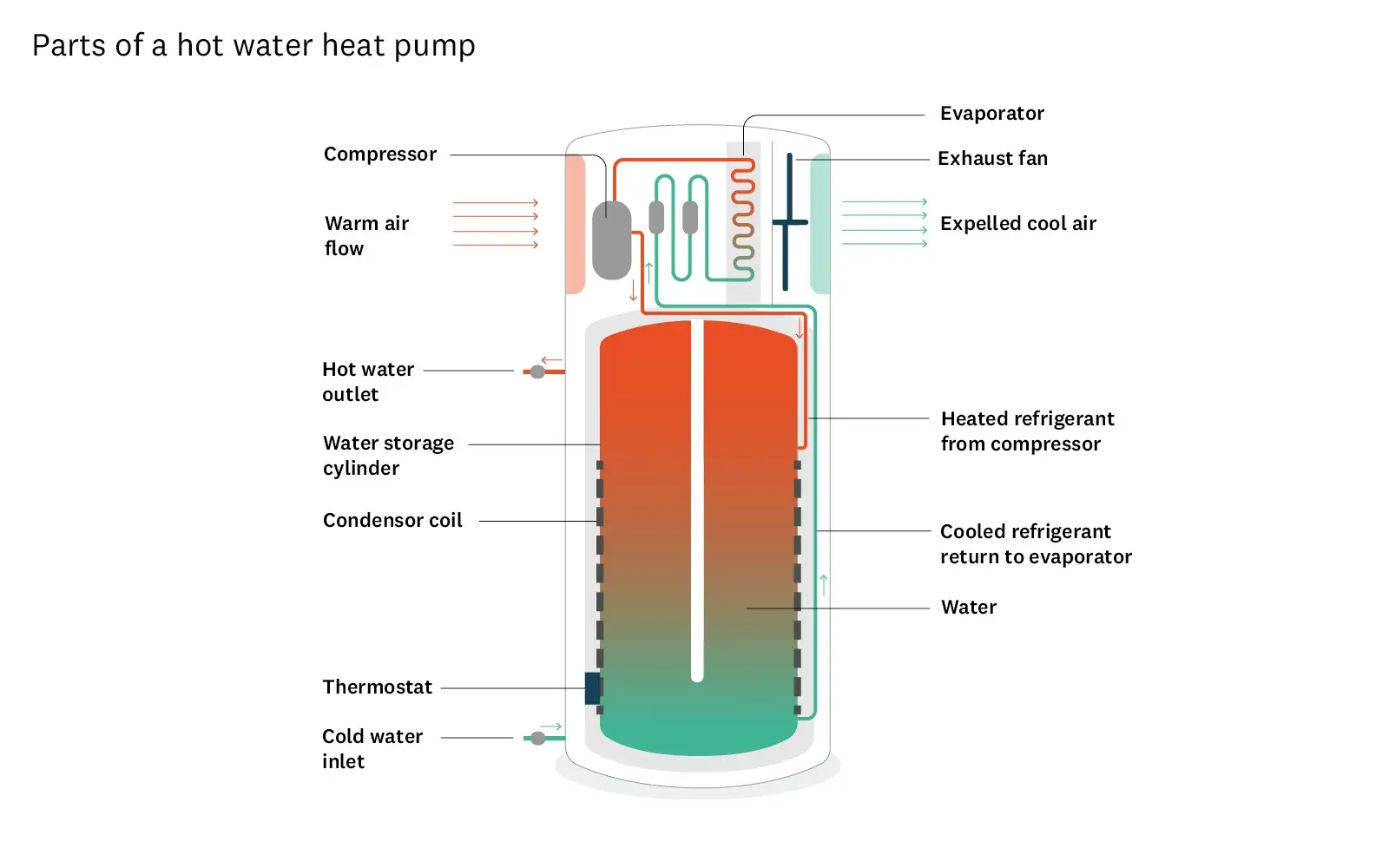Hot water heating makes up about 30% of the average Kiwi household’s energy use. Hot water heat pumps are an energy efficient and low emissions technology that significantly reduce household water heating costs.
Learn about how hot water heat pumps work, how much they can save the average household, and what types of homes they suit best.
Residential hot water heat pumps — highlights
- Typically use around 60 to 75% less electricity than conventional electric hot water systems.
- Low running costs.
- Up-front purchase costs are higher.
- Best for households that have adequate space for installation.
- Most cost-effective for households with higher hot water usage.
On this page:
- What are hot water heat pumps?
- Types of residential hot water heat pumps
- How do hot water heat pumps work?
- Hot water heat pumps and energy efficiency
- Advantages and limitations of hot water heat pumps
- Comparison of household water heating options
- Breaking down the costs
- Is a hot water heat pump the right option for your home?
- Refrigerants and global warming potential
This page focuses on hot water heat pumps for the home. For information around heat pumps for water and space heating in larger complexes, see Hot water heat pumps in commercial buildings.
Types of residential hot water heat pumps
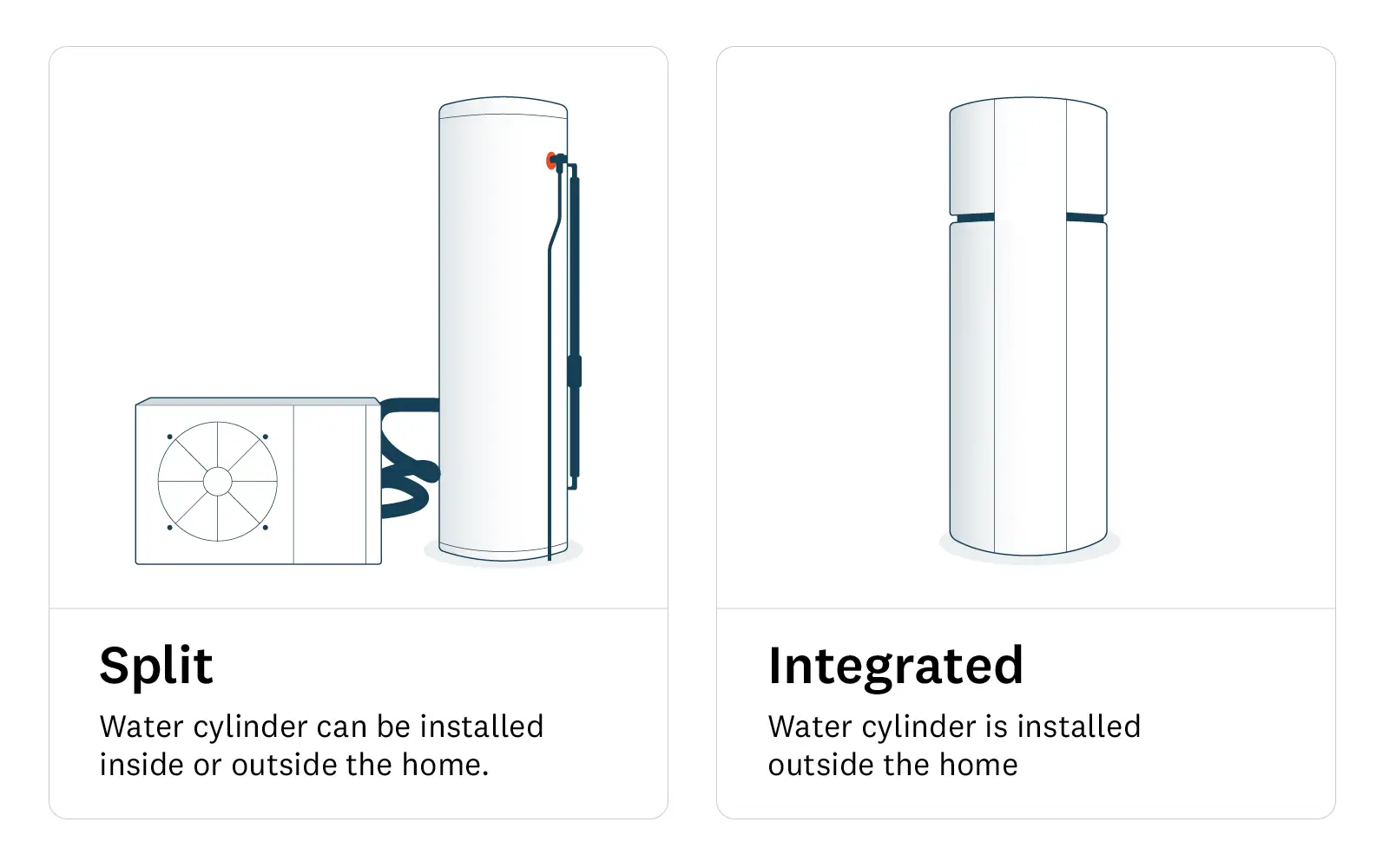
There are two main types of air-source hot water heat pumps, with the choice between the two largely determined by installation requirements.
- Integrated hot water heat pumps – These combine the components of a heat pump and a hot water cylinder into a single unit. The heat pump part of the unit is most commonly on top of the cylinder, and the single unit must be sited outside. Depending on the layout of your house and existing plumbing, this could offer easier installation.
- Split hot water heat pumps – These consist of two separate components: an outdoor unit, which contains the refrigerant circuit, and a separate hot water cylinder which can be located either outdoors or indoors. The outdoor unit and cylinder are connected with water or refrigerant pipework, which carries the heat to the cylinder. Split hot water heat pumps provide greater flexibility in installation, as the cylinder can be placed closer to the hot water consumption areas. It is also possible to retrofit the outdoor unit (the heat pump itself) to an existing hot water cylinder.
How do hot water heat pumps work?
Hot water heat pumps use a vapour compression cycle with a refrigerant fluid which works to extract heat from the air and transfer it to the water until the desired temperature is reached in the water tank.
This is done through the following steps:
- The refrigerant absorbs heat from the air and transforms from a liquid to a gas in the evaporator.
- The refrigerant is then compressed, which raises its temperature to above the desired hot water temperature.
- The hot, pressurised refrigerant then passes through a condenser coil, where it transforms from a gas to a liquid, giving its heat to the water.
- The liquid refrigerant then flows back to the evaporator coil to repeat the cycle.
Hot water heat pumps and energy efficiency
Heat pumps are highly energy-efficient compared to traditional water heating options.
For example, hot water heat pumps typically use around 60 to 75% less electricity than conventional electric hot water systems and can heat and store water to the same temperature and volume.
The coefficient of performance (COP) – a measure of how much useful energy is produced relative to the electricity input – tends to range from around 2 to 4 depending on the model specification and the conditions it is operating in (by comparison, a conventional electric hot water cylinder would have a COP just under 1). For example, a heat pump installed in Auckland will have a higher COP than the same model installed in Christchurch, because the average air temperature is higher so it will not have to work as hard to transfer the heat to the water.
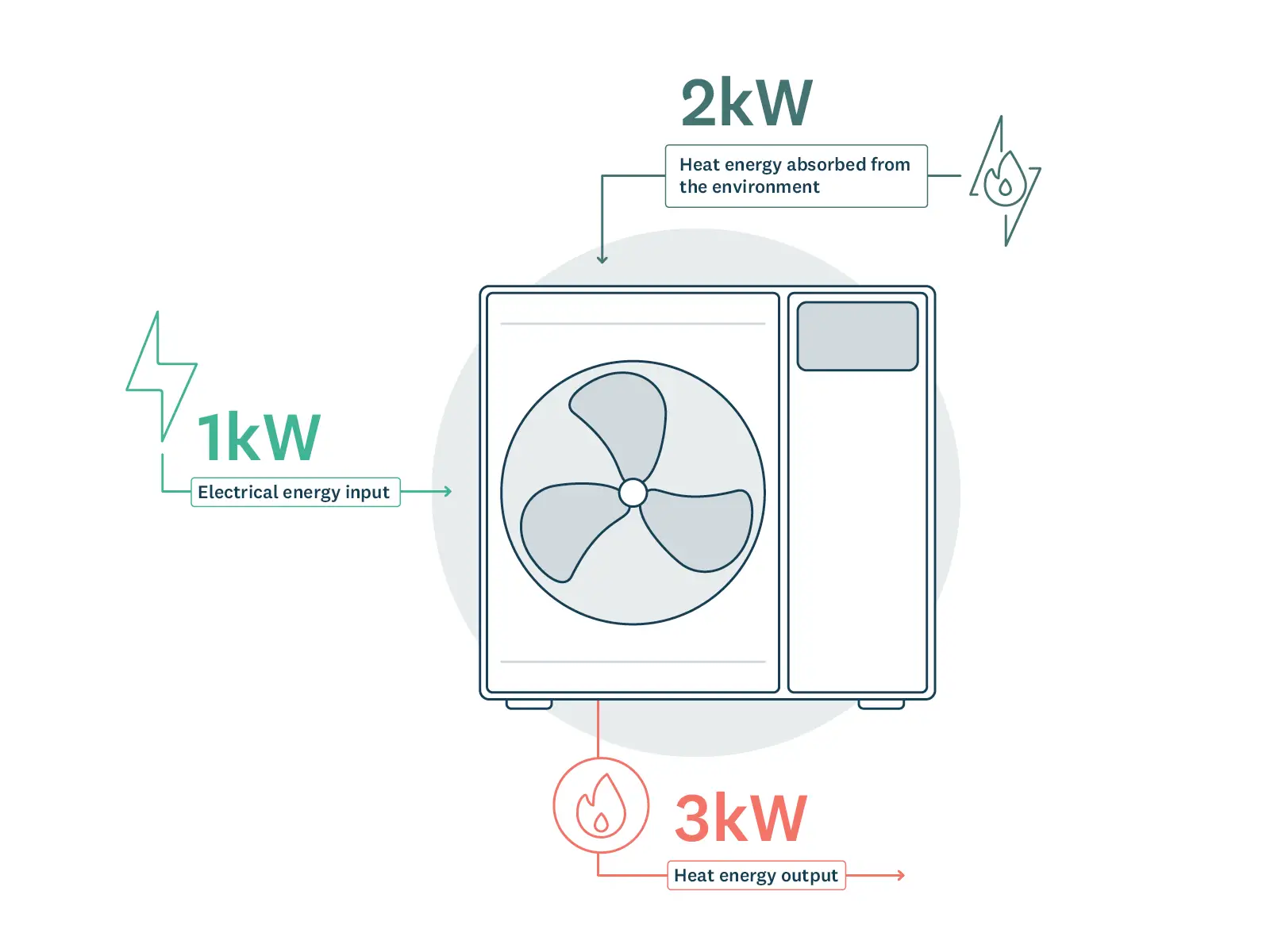
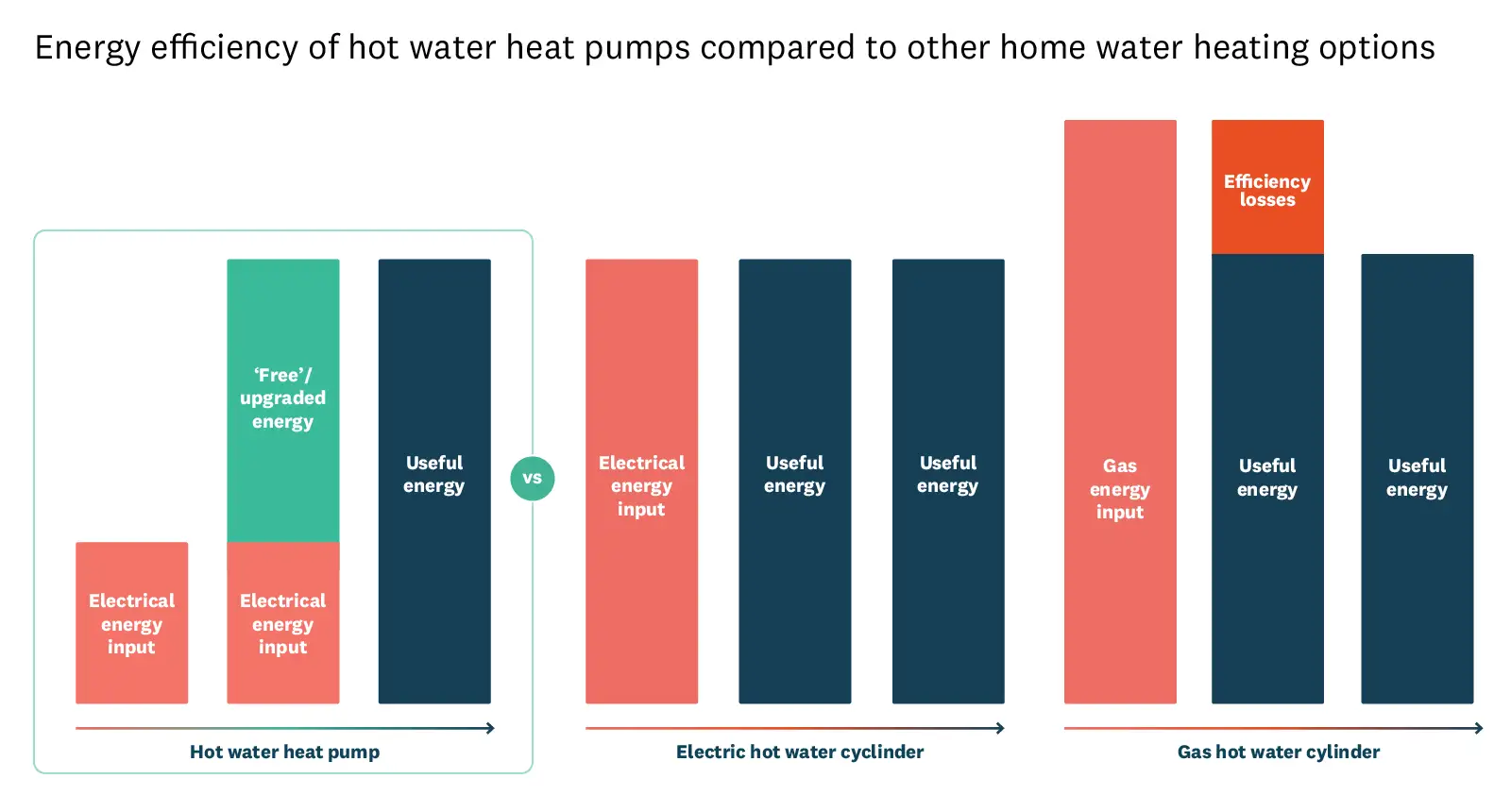
Advantages and limitations of hot water heat pumps
Advantages
- Energy efficient – A hot water heat pump system uses less electricity than an electric resistance hot water cylinders and less energy than gas water heating, as it only uses electricity to drive the compressor and the fan to circulate air, rather than using electricity to heat the water directly with an electric element.
- Lower emissions – Hot water heat pumps are powered by New Zealand’s low carbon electricity generation which means that very little carbon dioxide is emitted to power them. They use much less electricity than standard electric resistance hot water cylinders, and so will have much lower associated emissions. Compared to gas, they will have even lower emissions as they do not rely on fossil fuels to be burned to heat the water.
- Cost effective to run – Because they use less electricity, hot water heat pumps are cheaper to run than electric resistance hot water cylinders, and substantially cheaper than gas water heating. If you live in an area with higher electricity costs, the savings will be even greater. Hot water heat pumps are also cheaper to run than gas water heaters, as the cost of the electricity required to heat the water is less than what would be required from the equivalent of gas.
Limitations
- Higher capital and installation costs – Hot water heat pumps have higher upfront costs compared to traditional water heating systems. This means it may take some time to recoup the initial cost through energy savings.
- Shorter lifespan – Typically, if properly maintained, hot water heat pumps have a similar lifespan to gas hot water heaters (8 to 15 years), but shorter lifespans than standard electric resistance heaters which tend to last 10 to 15 years. This is due to them having more moving parts.
- Can be louder – Because they operate a fan to circulate air and a compressor, hot water heat pumps can make more noise than other methods of hot water heating. Given this, these components tend be located outside of the home, or in locations that will minimise the impact of noise.
- Can be less efficient in colder weather – When the ambient external air is cooler, such as in winter months, hot water heat pumps will lose some efficiency as they will need to work harder to transfer heat. Some models will have larger drops in efficiency with external temperatures, so it’s important to check specifications prior to purchase.
Comparison of household water heating options
-
Hot water heat pump
Highest up-front cost, lowest running cost, lowest GHG emissions.
On average, new hot water heat pumps cost around $7,500 to purchase and install, with higher costs for the most efficient models or larger systems. However, over time, they can become the most affordable option due to their significantly lower electricity consumption of $333 per year.* -
Electric hot water cylinder
Cheaper to install, costs more to run, more GHG emissions.
A new electric hot water cylinder will cost around $3000 to purchase and install. Whilst this is still an environmentally friendly option when compared to gas hot water heating, it is also the most expensive option over a 10-year period, with electricity consumption of $1,176 per year. Due to the higher electricity consumption, its operation is responsible for 3.5 times more CO2 emitted than hot water heat pumps.* -
Gas continuous flow system
Cheaper to install, costs more to run, highest GHG emissions.
A new gas continuous flow system costs the same to purchase and install as an electric hot water cylinder, at about $3000. However, this system will also incur a yearly gas connection fee which further adds to the operational costs over time. This makes its operational costs similar to an electric hot water cylinder at $1,071 per year. This option also emits around 6.5 times more CO2 than hot water heat pumps.*
* Based on a four-person household with average hot water usage. A full list of assumptions and can be found in the reference list at the end of this page.
Breaking down the costs
While the equipment and installation cost of a hot water heat pump is higher than other hot water heating systems, there is great potential to save money on energy costs and reduce carbon emissions over the medium to long term.
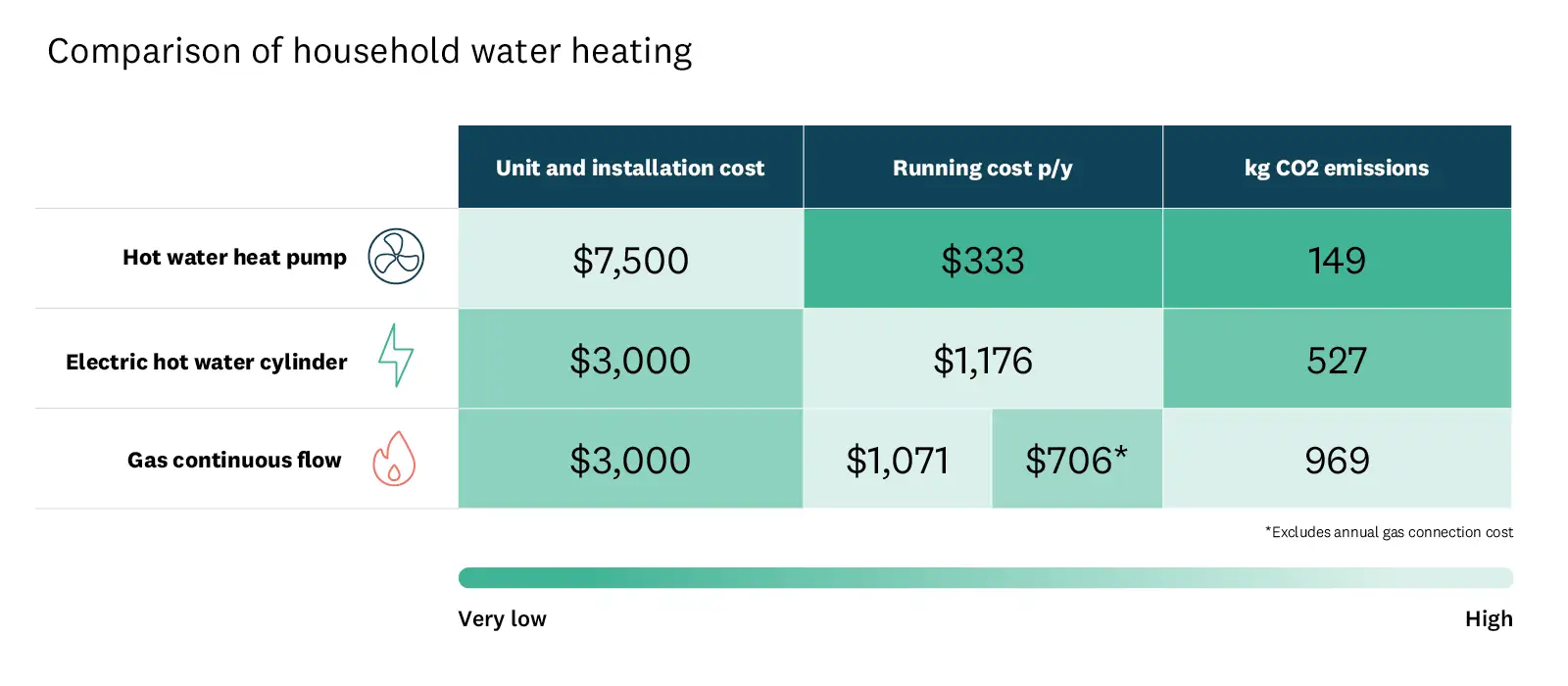
Savings over time
When the running costs of each option are extended over a medium to long term, the comparative costs savings of hot water heat pumps become clearer. The chart below highlights the total savings of installing and operating different methods heating water in New Zealand over a ten-year period.
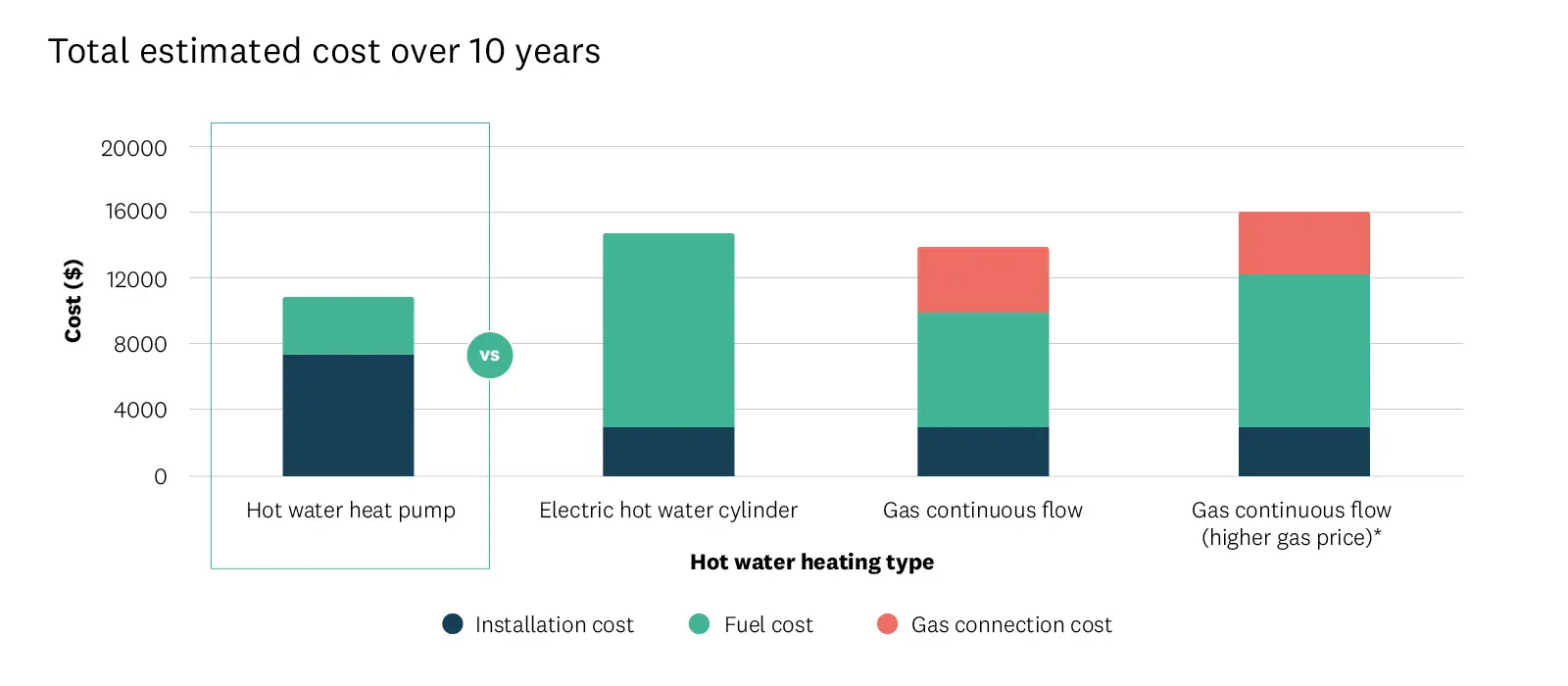
Calculations are based on a four-person household with average hot water usage. A full list of assumptions and can be found in the reference list at the end of this page.
Hot water heat pumps are the cheapest option over time
Over a 10-year period, the total cost of ownership of a hot water heat pump is...
- 21 % cheaper than gas continuous flow
- 27 % cheaper than electric hot water cylinders
Is a hot water heat pump the right option for your home?
Hot water heat pumps are gaining in popularity in New Zealand, but there are certain homes where they are best suited, such as:
- Homes with higher occupancy, or high hot water usage – If you use a lot of hot water in your home, switching to an efficient hot water heat pump will save you more energy and more money than the average household, which means a better return on investment. While hot water heat pumps can’t offer endless hot water like gas continuous flow water heaters, modelling has shown that with the right sized hot water heat pump, running out of hot water is rarely, if ever, a problem.
- Standalone homes – It is generally easier to retrofit or install hot water heat pumps to standalone homes, given the outdoor space required and plumbing requirements. For new build standalone homes, townhouses and even low-rise apartments, incorporating space for hot water heat pumps can easily be done up front.
- Homes with underfloor heating or radiators – You can get a hot water heat pump system that will power your underfloor heating and radiators as well as providing hot water. If your home uses these for heating, installing a hot water heat pump can make your space heating even more cost effective.
Refrigerants and global warming potential
Improper maintenance, servicing, and end-of-life disposal of hot water heat pumps can contribute to climate change due to the refrigerants they use. Hot water heat pumps employ a range of refrigerants, including commonly used options like R134a, R32, and R744 (CO2). It is important to note that certain older refrigerants have high global warming potentials (GWPs) when released into the atmosphere.
- R134a is a hydrofluorocarbon (HFC) refrigerant widely used in air conditioning and heat pump systems. It has a high GWP, contributing to climate change, and for that reason is being phased out in New Zealand.
- R32, also a HFC refrigerant, has gained popularity as a lower-GWP alternative to R134a. R32 is used in many newer air conditioning and heat pump systems in New Zealand.
- R744 (CO2, or carbon dioxide) is a natural refrigerant that has zero ozone depletion potential (ODP) and much lower GWP. CO2 refrigeration systems are commonly used in larger commercial applications, such as supermarkets and refrigerated warehouses.
- R290 (propane) has been used in industrial refrigeration for many years, and is emerging as an increasingly viable alternative for homes that will be available soon. With a very low GWP and zero ODP, R290 is seen as an environmentally friendly option.
It is important to note that while R32 has lower GWP compared to R134a, its use still requires proper handling and adherence to safety regulations to ensure safe and efficient operation. CO2 systems also require strict adherence to safety regulations due to the high pressures in these units.
End of life disposal
Once at the end of its life, a hot water heat pump should be removed by a suitably qualified company. They will remove and collect ozone-depleting refrigerants and will arrange for proper disposal of all components of the appliance. There is normally a fee for this service. If you do not know whether an appliance contains an ozone-depleting refrigerant or a synthetic greenhouse gas, you should still take a cautious approach and organise to have the gas collected by a suitable company.
Read next
-
Heat pump water heater product research
EECA is undertaking research to better understand the performance of hot water heat pump technology.
-
How New Zealanders are using energy, December 2024
The Consumer Energy Monitor (Q2 FY25) captures data on how New Zealanders are interacting with energy in their homes.
-
Save energy at home
There are plenty of things you can do to reduce your energy use and save on your power bill.

